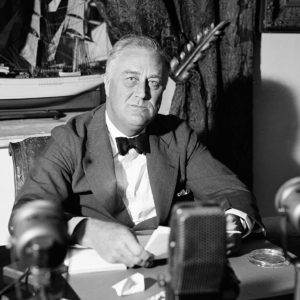Hard times call for tough measures.
Korea’s gross domestic product is going down. That’s deeply worrying. Not since 2008, at the height of the last global economic crisis before the current pandemic, has the Korean economy been shrinking.
The reason this time is the shutdown of factories and companies inside Korea on top of diminishing exports to countries whose economies are also suffering as COVID-19 spreads rapidly in the pandemic’s second wave.
In Korea, the government of the liberal President Moon Jae-in has come up with what it calls a “New Deal” echoing the “New Deal” engineered by U.S. President Franklin Delano Roosevelt, who won a landslide victory in the 1932 presidential election three years after the New York stock market crash of 1929. “Wall Street Lays an Egg,” was the famous headline in the show biz paper “Variety” the next day.
FDR propounded a wide range of programs in the 1930s His New Deal is best remembered today for the social security program instituted in 1935 that provides pensions along with Medicare health insurance for the elderly that’s desperately needed by millions in the twilight of their lives.
By 1933, as Roosevelt took office after voters overwhelmingly repudiated the Republican Herbert Hoover for mismanaging the economy in his four years as president, the economy had shrunk by 29 percent and unemployment had soared 25 percent.
For most of the 1930s, until the onset of World War II in 1941, the U.S. suffered what came to be known as “the Great Depression.” As industries collapsed and banks, shops and markets shut down, the Depression was far more serious than anything Korea has suffered since the Korean War ended in July 1953.
One of FDR’s enduring achievements was the Federal Deposit Insurance Corporation guaranteeing a return on losses for accounts up to a certain amount if a bank failed.
The FDIC’s initial guarantee in 1934, as scores of banks were closing, covered accounts up to $2,500. Today, it guarantees up to $250,000. FDR also rammed through programs designed to create jobs and build up the country’s infrastructure.
The Civilian Conservation Corps, hiring workers who had lost their jobs, was tasked with projects ranging from road-building to fighting forest fires.
As a result of FDR’s leadership through the Great Depression and then World War II, millions of Americans claimed to be “New Deal Democrats.”
Elected four times as president, FDR, stricken by polio years before, tired and haggard from the deep strains of the war, died in April 1945 shortly after his inauguration to an unprecedented fourth term.
Historians question, though, whether the New Deal really saved America from depression.
In 1937, while the Japanese were marauding China and Germany was rampaging through Europe, the U.S. economy was again falling into the doldrums.
“The stock market plunged,” said Allan Winkler, a professor at Miami University in Ohio, in testimony before the U.S. Senate Committee on banking, housing and urban affairs in 2009. “Unemployment soared back to 19 percent.”
Well before the U.S. declared war on both Germany and Japan four days after the Japanese bombing of Pearl Harbor in December 1941, the U.S. was responding to the threat with much needed investment in war industries.
“Defense spending quadrupled, and unemployment vanished virtually overnight,” Winkler told the Senate committee. “There was no need to suffer the ravages of depression any longer.”
Demand for vast amounts of war materiel from weapons and ammunition to motor vehicles to airplanes, not all those New Deal programs, was responsible for America’s rise as the world’s strongest nation. War production, said Winkler, provided “the tools to help the economy revive.”
The lesson for Korea is clear. The New Deal may sound fine on paper, in the media, but there’s no certainty it will really help.
The Korean New Deal “takes its cue from President Roosevelt’s famous initiative that helped the U.S. recover from its worst economic crisis,” writes former CNN journalist Sohn Jie-ae for the Korea Culture and Information Service of the Ministry of Culture, Sports and Tourism, but the Korean program bears little resemblance to FDR’s New Deal.”
On “why Korea must pursue the New Deal,” Sohn tells us, “President Moon emphasized the need for the country to be the world’s best for digital technology and lead a new world order of solidarity and cooperation to resolve the climate crisis.”
Korea, however, needs more than promises of “going digital and green,” that is, digitizing industries and reducing dependence on oil and natural gas at vast expense over the next five years.
More properly, the lesson of FDR’s New Deal is that it took victory in a terrible war to make America great again on the world stage. If Moon is going to cite the American New Deal as an example, he should remember the U.S. did not recover until defeating the twin dictatorships of Japan in Asia and Germany in Europe.
As the history of World War II shows, Moon’s fantasy of a New Deal will never work as long as he dreams of appeasement with North Korea.

